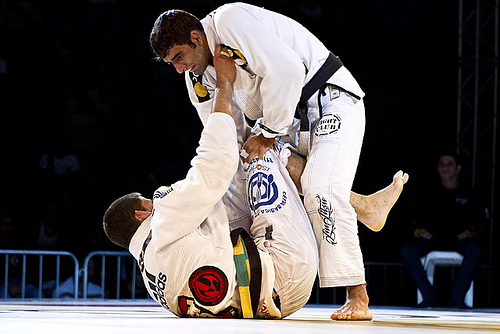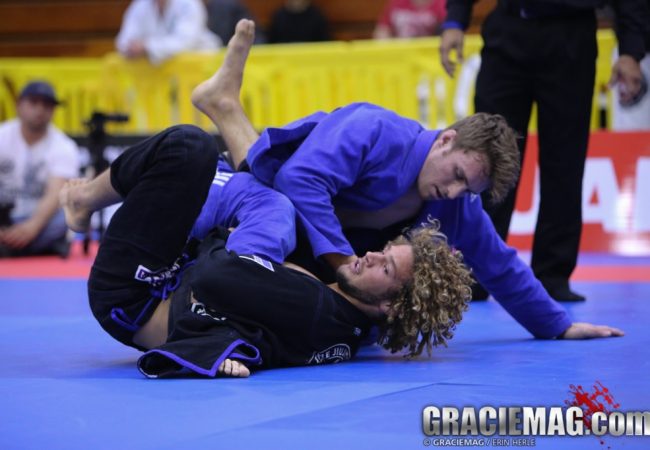Brandon Russell is a senior airman and firefighter in the US Air Force. He provides life safety, EMT/paramedic and property conservation services to the military branch, but he is also a trained military man, so he has to provide combative force as well. Like most soldiers, Russell has always been 100% confident in his combat skills and his military training; at least he thought he was, until he discovered Jiu-Jitsu.
Russell joined the Air Force after high school and became a firefighter. He says it’s like having two jobs in one. While Russell was deployed in Afghanistan, he met someone who was training in Jiu-Jitsu. “She was pulling up Jiu-Jitsu Youtube videos and we were watching them together,” he says, “I thought, ‘WOW! I want to do this!’”
After his deployment was over, Russell went back home to Arkansas and discovered that Paulo Ribeiro was teaching Jiu-Jitsu at GB Jacksonville (he is now with GB Naples) right around the corner from his house. “I went to watch a class,” he says, “They gave me a gi and I started rolling. I thought it was the greatest thing ever. Man, did I get beat up! I was choked out numerous times. I loved it!”
Russell was hooked. He signed up and kept training. A month later, he decided to enter a Jiu-Jitsu competition. “I got smashed,” he laughed, “I got beat pretty bad. But it didn’t discourage me. It lit a fire under me.”
Russell says he was surprised he was getting beat up on the mats and at tournaments. He’d gone through weeks and months of training in the military and lifted weights as well and thought he was unbeatable. “But I was wrong,” he says, “It sparked an interest in me to learn it full time. I had to learn the whole combative situation. There were people on the mats smaller than me beating me. I thought, ‘I have to learn this sport.’”
Russell is a lightweight and was not happy when roosterweights were smashing him on the mats. “I had to put my ego at the door,” he says, “It was killing me. I said, ‘I’m gonna commit to training now.’ I started training two times a day or whenever I could. I would work my 24-hour shift, then when I was off shift, I’d train two to three times a day.”
In the beginning he was really hard on himself about losing and thought maybe Jiu-Jitsu wasn’t for
him. “Everything I tried, I kept losing. I thought my professor (Eder Persiliano) must be hiding some secret technique from me,” he laughs, “So, I went back and talked to him about how he dealt with his losses. I had to think about my mental state, the rest I was getting, my training regime, even my personal relationships. I thought, ‘What did I do wrong? What were the events that led up to the issue?’ Jiu-Jitsu put the onus back on me and not on the other person.”
Russell started traveling around to IBJJF competitions. All his hard work and effort began to pay off. “As a blue belt I started placing and winning tournaments,” he says.
Then something completely unexpected happened. Russell was invited to teach Jiu-Jitsu at the 39th Brigade Army Infantry by their commander. “That’s a huge deal,” he says, “I was honored. I’m in the Air Force and the Army is asking me to come teach for them. They wanted to know how they could use Jiu-Jitsu in their combative course work.”
So Russell began teaching the Army Jiu-Jitsu, and at the same time, he started helping GB Jacksonville market their school. “I helped at demonstrations at MMA events,” he says, “Jiu-Jitsu isn’t as big in Arkansas as it is in other places.” Russell also took to the mats and began teaching in the kids and beginner/adult classes.
Now a purple belt, Russell can still be found on the IBJJF circuit, traveling around to competitions and living the Jiu-Jitsu lifestyle, but it’s a bit more of a struggle than before. “I just got back from the Dallas Open,” he says, “I got my purple belt a month ago and I came in third place. My desire to get better is huge. I’m going to have to train harder to be able to compete at this level.”
Russell says there’s a big difference in the purple belt competition. “As a blue belt I was winning everything in the South,” he says, “Now I’m getting third everywhere, but I like it. It makes me more humble. I just have to start over and build myself up again. I need to forget about my past accomplishments and focus on the future.”
As for the future, Russell is leaving for Colombia on the 1st of June for “Operation Drug Interdiction” deployment. “It’s a small base,” he says, “We’ll be helping to stop the flow of drugs going in and out of the area.” Russell will be gone for six months. Although he’s been in the Air Force for six years, he says this is the first time he’ll be gone on this kind of deployment. “Before, I had convoy duties and watching aircrafts,” he says, “Those were moderate risks; this is a little higher.”
Russell feels better equipped to handle issues like this, though, because of Jiu-Jitsu. “It’s made me calmer,” he says, “It’s helped me put things in perspective. I now think in terms of steps. I’m now organized in achieving and meeting my goals. I also wasn’t as outgoing as I am now! Jiu-Jitsu has definitely changed me as a person.”
Russell wants to leave a legacy through his work in Jiu-Jitsu. “I want people to believe that whatever they set their mind to, they can achieve because I did,” he says, “Only you can determine how far you go in life. I want to compete as much as I can and share my experiences with other people. When I die, I can’t take it with me, so I want to help other people as much as I can.”
Going from a civilian to a military man has changed Russell significantly, but it’s his participation in Jiu-Jitsu that’s changed him the most. “My self confidence has raised and I’m more patient. When it comes to personal problems I can calmly relax and talk through them and come up with solutions. It’s the same way on the mats in Jiu-Jitsu when I’m in a bad situation. I don’t freak out. I figure out the best solution to get out of it and I do it. I wasn’t always that way before.”
Russell particularly enjoys the competitive side of Jiu-Jitsu. “You find out new things about yourself,” he says, “You get to break down walls. The fear and anxiety of winning or losing… facing people in competition… but still doing it anyway and thinking, ‘I can do this!’ You’re constantly overcoming your fears and I like that about it. You get stronger from it.”
Russell says that going into a competition with an opponent puts you in the middle of a battle that you have to calmly think your way through. “You constantly have to encourage yourself to fight,” he says, “You have to remind yourself that you’ve been rehearsing for this moment for a long time and that you can do it. Win or lose, you prove something to yourself. You did it. It’s a great feeling.”
Russell loves Gracie Barra and says he wants to be one of those people who does well for them on and off the mats. “I’m GB for life,” he says, “When I’m a brown belt, I’m getting the tattoo. It’s coming soon!”
Russell has a very busy life. “I work a lot, I train hard, I go away on deployments, and I have to make time for competitions… it’s hard on my family, but I thank God for the opportunities I have, for my family, my GB professors, my sponsor Masaru Fight Company, and for Justin Rader. We talk and he’s helped me out with my diet and other aspects of my competition. I was star struck when I first saw him and yet, he was so cool! You see him winning tournaments… I was like, ‘Wow!.’ He’s helped me out a lot.”
Russell says more than anything and by far, his greatest accomplishment will always be his daughter, Brandi. “She’s the best thing I ever helped make,” he says, “She always has that smile.”






